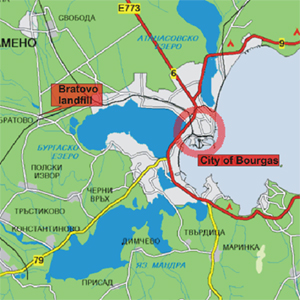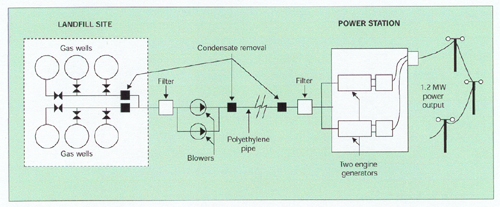 |
 |
 |
 |
 |
 |
 |
 |
 |
 |
 |
 |
Project description
Name of the case study
Municipal System for Biogas Extraction and Utilisation
Description of context
The analysis made by experts of Bulgarian Ministry of Environment and Water in 2000 outlines general strengths and weaknesses in the waste management sector in the country. In the report presented (National Strategy for the Environment and Action Plan 2000-2006) the implemented national, municipal and company programmes on waste management are considered relevant to EU legislation. Yet, some peculiarities of the local context have to be taken into consideration:
(i) The only currently applied waste treatment method in the country is landfilling.
(ii) There is no system of separate collection, packaging, recycling, etc. of municipal solid waste.
(iii) The municipal solid waste fees do not cover all the waste collection and disposal expenditures as required by legislation.
A number of key documents for the successful management of Bulgarian waste sector, treat the problems emerging:
• The National Strategy for the Environment and Action Plan 2000-2006 traces three main groups of action for the improvement of waste management: (i) establishment of an integrated system of waste treatment facilities; (ii) establishment of operational mechanisms of the system for waste separate collection, recycling and reuse; (iii) considerable improvement of settlements’ cleanness (20 actions with time limit and expected effects are envisaged).
• The Law on the Reduction of the Harmful Impact of Waste upon the Environment (RHIWEA) introduces a comprehensive approach to waste management for the first time in Bulgaria and transposes the requirements of the EU Frame Directive on Waste (Directive 94/62/EC, 20 December 1994, on packaging and packaging waste).
• The National Waste Management Programme defines a number of objectives: treatment of waste with minimum risk for the public health and environment; establishment of an appropriate system of installations and facilities for integrated waste management; public participation and education programmes, etc.
• Municipal Waste Management Programmes have been adopted in each Bulgarian municipality following the methodological guidelines of the Ministry of Environment and Water (MoEW). The programmes are expected to facilitate problem-solving in waste management at the local level.
• Company waste management programmes are considered a useful instrument for both business companies (generating waste over a fixed quantity) and for the municipal administrations (providing a clearer view of the industrial, constructions and hazardous waste on the territory of the municipalities). The firms are obliged to prepare their waste management programs following methodological guidelines of the MOEW.
Description of project - background
The Municipality of Bourgas initiated the project as a pilot for Bulgaria in January 2000. It was based on the Municipal Waste Management Programme (1998-2008). The Municipality jointly with Brown, Vence & Associates, Inc. (BVA, USA) investigated possible options for extracting and utilizing landfill biogas from municipal landfill Bratovo, one of the few sanitary landfills in Bulgaria. Partial funding for the investigation was provided by Ecolinks, an USAID (United State Agency for International Development) initiative focused on finding market-based solutions to industrial and urban environmental problems in Central and Eastern Europe and the former Soviet Union. A local environmental NGO (Greener Bourgas Foundation) was also a project partner.
The partnership built between different levels (international, national and local) could be considered an innovative approach to integrate solutions of economic, social and environmental problems (local - pollution of the water resources around and global - Greenhouse Gases).
Description of project - objectives/aims
The Municipality includes city of Bourgas which is the fourth largest in Bulgaria. Bratovo landfill opened in 1981 and is expected to reach its full capacity and close in 2007. (see diagram below).
The landfill currently receives 60,000 tonnes of solid waste annually generated by households and industry in the region which has a population of 270,000 people. Landfill biogas (LBG) results from the decomposition of biological waste which is a component of general household waste.
The project aims to implement an efficient system for biogas extraction and utilisation from existing waste landfills. This utilises methane which results from municipal waste decay. Thus existing pollution is converted into useful source of electric and heating energy.
The following potential markets for energy recovered from LBG generated by Bratovo landfill were assessed: selling electricity to the National Energy Company (NEC), selling gas to the District Heating Plant, selling electricity or biogas to a neighbouring industrial facility, and selling compressed natural gas (CNG).
Several proposed options in the LBG utilization project were all aimed at the installation of a LBG Collection and Monitoring System to help control methane emissions. The implementation of a landfill biogas system was expected to reduce methane emissions by 17 300-29 400 tons over a period of 20 years.

City of Bourgas and existing landfill location
Description of project - time interval and stages
The project was envisaged in four stages:
(i) Preliminary investigation – choosing a biogas extraction system among possible alternatives which included analysis of the existing biogas volume, market value of the product, opportunities for technical implementation and environmental impact;
(ii) Financial analysis of the construction process of the chosen system.
The conclusion drawn after the implementation of the two stages was that using the biogas for electricity production would be the most efficient alternative in this particular case. (see below)
(iii) System construction – analysis of existing opportunities for financial support; technical testing of the biogas extraction system;
(iv) Exploitation.

LBG Power Plant technology scheme
Description of project - financing
The project was financed by a USAID grant of US$ 50 000. According to the analysis presented, the project implementation would cost approximately US$ 3.2 million (6.4 million BGN). Three basic forms of financing were considered:
• public ownership and operation,
• public/private joint venture with private operation,
• private ownership and operation.
The municipality met major difficulties in finding financial sources and because of this, the project has not yet been realised.
It was estimated that the implementation of the recommended project would need approximately 18 months. A strategic partner (investor) had to be selected at the very beginning of the process.
Description of project - other sectors involved
The project is linked to the energy sector by the possibilities for connecting to the local energy system or selling the electricity produced to a private customer, an electric transmission or distribution enterprise, or NEC.
What tools were used to assess sustainability?
Multicriteria analysis (Brown, Vence and Associates, Inc.)
More information